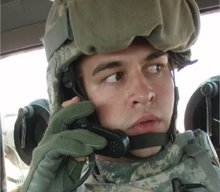Well, I've been tagged 3 times now as a "Thinking Blogger". The Thinking Blogger award was invented by a blogger who was tired of the typical inane representatives of the internet meme genre, so he began his own, dedicated to the bloggers that made him think. Apparently I made at least three people think. I'm beginning to feel I won't stop getting tagged unless I pass it on, so... *grin*
1) The Fourth Rail
Bill Roggio consistantly produces some of the highest-quality reporting about Iraq. He is well informed and grounded in many of the basic facts of the country, especially the al-Anbar province.
2) Jules Crittenden
Consistant reporting on a wide variety of issues and an inside look at the media process make this Boston Herald editor's blog another daily read.
3) Patterico's Pontifications
1) The Fourth Rail
Bill Roggio consistantly produces some of the highest-quality reporting about Iraq. He is well informed and grounded in many of the basic facts of the country, especially the al-Anbar province.
2) Jules Crittenden
Consistant reporting on a wide variety of issues and an inside look at the media process make this Boston Herald editor's blog another daily read.
3) Patterico's Pontifications
Patterico brings engaging and informed discussion on legal cases and much more. Great stuff.
4) Iraq the Model
4) Iraq the Model
Lex is a Navy officer, old flyboy and Top Gun instructor who blogs about military and political news, and a whole lot else besides.
Rules:
1. If, and only if, you get tagged, write a post with links to 5 blogs that make you think.
2. Link to this post so that people can easily find the exact origin of the meme.
3. Optional: Proudly display the 'Thinking Blogger Award' with a link to the post that you wrote (here is an alternative silver version if gold doesn't fit your blog).
If you're interested, here are the people that tagged me, and what they had to say:
ALa says:Keeping us informed about what is really going on with Al Qaeda in Iraq.
SGT Dub says:TD is serving with his unit in Iraq and besides giving us the news of what's happening in the war, he's a poet and thinker, quite a plate full for such a young man.
Sarge Charlie says:This young man never ceases to amaze me with his skill as a writer, while clearing the roads in Iraq of Land Mines and IED. He puts his life at risk each day and when time permits he will produce photos, poems, and narration equal to Ernie Pyle during WWII.
Rules:
1. If, and only if, you get tagged, write a post with links to 5 blogs that make you think.
2. Link to this post so that people can easily find the exact origin of the meme.
3. Optional: Proudly display the 'Thinking Blogger Award' with a link to the post that you wrote (here is an alternative silver version if gold doesn't fit your blog).
If you're interested, here are the people that tagged me, and what they had to say:
ALa says:Keeping us informed about what is really going on with Al Qaeda in Iraq.
SGT Dub says:TD is serving with his unit in Iraq and besides giving us the news of what's happening in the war, he's a poet and thinker, quite a plate full for such a young man.
Sarge Charlie says:This young man never ceases to amaze me with his skill as a writer, while clearing the roads in Iraq of Land Mines and IED. He puts his life at risk each day and when time permits he will produce photos, poems, and narration equal to Ernie Pyle during WWII.
Leave a comment with some of your daily reads, too.

